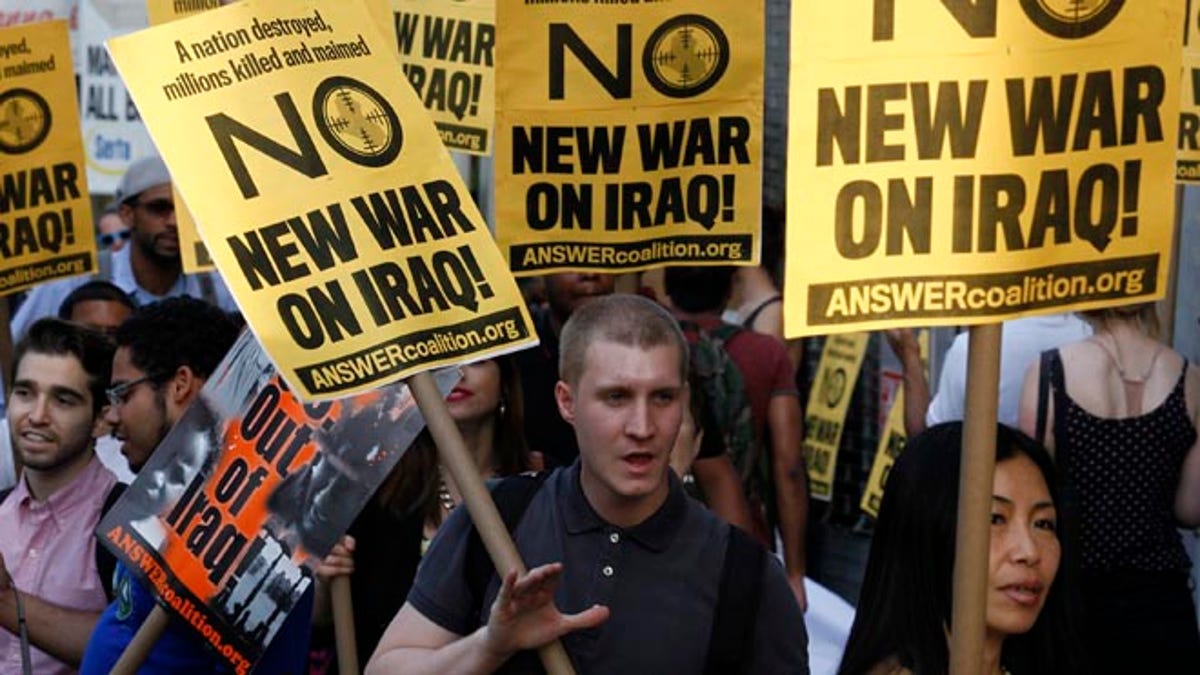
FILE: June 20, 2014: A politically oriented rally against further U.S. involvement in Iraq, in New York, (REUTERS)
The New York State Board of Elections has enacted emergency regulations to keep a closer eye on political spending by special interest groups, but critics say the changes are over-reaching and will stifle free speech.
The new regulations require individuals and groups spending on races -- independently of candidates and political parties -- to register with the state as a political committee and file financial reports that list so-called “independent expenditures.”
In approving the regulations this spring, the non-elected board members set forth a generally-accepted list of expenditures that includes spending on TV, print and radio ads that reach more than 500 residents.
The list also covers ballot initiatives and makes clear that ads and other communications that include such words as “vote” and “oppose” or call for the defeat of a specific candidate are considered an independent expenditure.
However, critics argue the list goes too far by including circulars and brochures, which they say will make a political committee out of somebody on a street corner passing out fliers detailing a candidate’s questionable voting record.
Attorney Caleb Burns told FoxNews.com this week that the new requirements "are really fundamental attacks cloaked as disclosures on First Amendment freedoms and the right to political speech."
Burns, a partner in the Washington law firm Wiley Rein, also thinks the changes could have a more far-reaching effect than what might appear in squelching political speech, considering an individual or small group will likely have neither the ability nor desire to complete the paperwork -- including weekly reports on contributions of more than $1,000.
In addition, if such individuals or groups are forced to become a political committee, then their contributors list will be made public, potentially intimidating them out of politics, he says.
The list of identifiable words also includes “patriotic” -- similar to the word "patriot" that IRS agents looked for when targeting Tea Party groups and other conservative-leaning political organizations applying for tax-exempt status.
The regulations are in effect only during election years. But those who fail to disclose an expenditure face a fine from $1,000 to the cost to the advertisement.
The New York regulations follow the 2010 Supreme Court ruling on Citizens United v. Federal Election Commission that keeps the government from restricting independent expenditures and congressional Democrats trying to re-imposes tighter regulations through so-called DISCLOSE legislation.
“Democrats only care about money in politics when that money is being spent against Democrats,” said David Laska, communications director for the New York Republican Party. “We don’t see any reason why hardworking taxpayers can’t take part in the political process at a grassroots level. Basic fairness demands it, and the First Amendment commands it.”
Scott Blackburn, a research fellow at the Center for Competitive Politics, wrote in a recent New York Post op-ed piece that the regulations are so expansive that “almost anyone, citizen or organization, hoping to have their say on any issue could find themselves in bureaucratic dire straits.”
However, his concern about somebody passing out political fliers at a Little League game appears itself to be a far-reaching concern, considering the new regulations require reporting of independent expenditures exceeding $5,000.
FEC Chairman Lee Goodman tells FoxNews.com that the line between issue advocacy and express-election advocacy, under the First Amendment, is important and that the high court has that made the distinction and its regulatory implications “quite clear” in a series of decisions.
He says express advocacy is a message that in explicit words exhorts voters to vote for or against a clearly identified candidate, and the FEC has extensive regulatory jurisdiction over the funding of these messages.
Issue advocacy, Goodman says, is a message that discusses public policy and mentions a public official or candidate's position on that issue, and the First Amendment severely limits the FEC's authority to regulate such issue speech.
“The FEC very carefully distinguishes between issue advocacy and express election advocacy in every regulatory action we take," he said. "New York's election rules should be judged by the same First Amendment standards that apply to the FEC."




